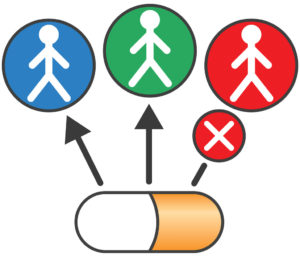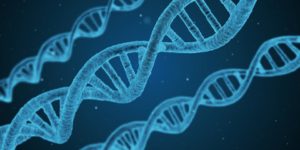Personalised cancer medicine
Background
In the past decade, the treatment of kidney cancer has become more successful and patients are now living with advanced disease for on average around 2 years, but in some cases much longer. With the introduction of targeted therapies (see below), overall survival has been extended considerably, and the advent of modern immunotherapy drugs has offered a lifeline to those patients who had come to the end of the line with respect to treatment options. The ultimate aim of researchers is to personalise each patient’s drug treatment plan to improve overall survival, and with tolerable side effects to ensure a good quality of life.

Despite their efforts, researchers have been unable to identify a reliable biomarker for kidney cancer treatments. This is mostly due to the large number of different types of cancer cell (heterogeneity) in kidney cancer tumours. A biomarker is a naturally occurring substance, gene, or clinical characteristic (e.g. blood pressure) by which a particular biological process or disease can be identified, and is often measured and evaluated to examine a biological response to treatment.
Identification of a biomarker would help to personalise treatments: Only patients who are likely to benefit from the drug will be treated, thereby potentially increasing average benefits from treatment across large groups of patients. For example, about a third of patients derive very little benefit from treatment with sunitinib (Sutent); knowing who these patients are in advance would spare them an ineffective treatment and the side effects of sunitinib. These patients could then be treated straight away with another drug, which could potentially offer them significant additional benefits without wasting time on an ineffective drug.
What is personalised medicine? 
Personalised medicine is medical care in which the treatment is tailored for an individual patient based on their predicted response. Optimal treatments are selected based upon a person’s genetic makeup and how their tumour grows. Using these data, doctors can find treatments that may be more effective and have fewer side effects than standard treatment options. By performing genetic tests on the cancer cells and on normal cells, doctors can tailor treatment to each individual patient’s needs.
Personalised medicine can help doctors to:
- Determine the chances that a person will develop cancer and develop screening programmes to lower the risk
- Match patients with treatments that are more likely to be effective and cause fewer side effects
- Predict the risk of the cancer coming back (recurrence).
Currently, a one-size-fits-all approach is used for the treatment of kidney cancer: Most patients with kidney cancer received the same treatment, and some treatments worked better for some patients than for others. For some types of cancer, developments in the field of genetics has led researchers to identify genetic differences in people and their tumours, which explains the different responses to treatment. This is currently not the case for kidney cancer; however, researchers are currently looking for biomarkers in kidney cancer tumours that will identify which patients might respond to particular drugs.
There are three main types of personalised therapy:
- Targeted therapy
- Pharmacogenomics
- Gene therapy
More information about personalised therapy can be found on the Cancer.net website.
What is targeted therapy?
Targeted therapy is a treatment that targets and blocks specific proteins, called receptors, on cancer cells that enable the cancer cells to grow and survive. Researchers are finding new targets each year and creating and testing new drugs for these targets. Treatment with a targeted therapy depends on finding out whether the tumour has the specific receptor by testing a sample of the tumour.
Targeted therapy is used for the treatment of breast cancer, colorectal cancer, gastrointestinal stromal tumour (GIST), lung cancer, melanoma, multiple myeloma, some types of leukaemia and lymphoma, and kidney cancer. Examples of targeted therapy that is used for treating kidney cancer include:
- Tyrosine kinase inhibitors (TKIs); sunitinib (Sutent), pazopanib (Votrient) and axitinib (Inlyta)
- Mammalian target of rapamycin (mTOR) inhibitors; everolimus (Afinitor)
- Immune checkpoint inhibitors; nivolumab (Opdivo)
More information about targeted therapy can be found on the National Institute for Health (NIH) National Cancer Institute website.
What is pharmacogenomics?
 Pharmacogenomics is the study of how genes affect the way a person processes and responds to drugs. This relatively new field combines pharmacology (the science of drugs) and genomics (the study of genes and their functions) to develop effective, safe medicines and doses that can be tailored to a person’s genetic makeup.
Pharmacogenomics is the study of how genes affect the way a person processes and responds to drugs. This relatively new field combines pharmacology (the science of drugs) and genomics (the study of genes and their functions) to develop effective, safe medicines and doses that can be tailored to a person’s genetic makeup.
The way a person processes and responds to a particular drug can influence how effective and safe the drug is for that person. For example, some people may process a drug more quickly than others. These people would require a higher dose of the drug for it to be effective. However, someone else’s body may not process a drug as quickly. The drug would then stay in the bloodstream for a longer time and may cause more severe side effects.
An example of the use of pharmacogenomics for cancer treatments is as follows: Some people with colorectal cancer have a specific altered (mutated) gene, which makes it harder for them to break down the drug irinotecan (Camptosar). This can lead to serious side effects. Patients with the mutated gene are prescribed a lower dose of irinotecan to avoid the serious side effects.
More information about pharmacogenomics can be found on the Cancer.net website.
What is gene therapy?
 Gene therapy is an experimental technique that uses genes to treat or prevent disease. Gene therapy will eventually enable doctors to insert genes into the cells of patients to give the cells a new function, or to restore a missing or inappropriate function as a result of cancer or a gene mutation. This will reduce the need for drugs or surgery.
Gene therapy is an experimental technique that uses genes to treat or prevent disease. Gene therapy will eventually enable doctors to insert genes into the cells of patients to give the cells a new function, or to restore a missing or inappropriate function as a result of cancer or a gene mutation. This will reduce the need for drugs or surgery.
Researchers are testing several approaches to gene therapy, including:
- Replacing a mutated gene that causes disease with a healthy copy of the gene
- Inactivating, or ‘knocking out’ a mutated gene that is not functioning properly
- Introducing a new gene into the body to help fight a disease.
Although gene therapy is a promising treatment option for a number of diseases (including inherited disorders, some types of cancer, and certain viral infections), the technique remains risky and is still under study to make sure that it will be safe and effective. Gene therapy is currently only being tested for the treatment of diseases that have no other cures.
More information about gene therapy can be found on the Cancer Research UK website.
The future of personalised medicine
Not all types of cancer have personalised treatment options, and in a lot of cases, personalised medicine is still experimental and only available through a clinical trial. Genetic testing of patients and tumour samples can be costly and time-consuming, and is not available within the NHS. Finally, personalised treatments, such as targeted therapies for kidney cancer, can be expensive for the NHS.
However, personalised medicine is evolving and doctors still don’t know all the genetic changes that occur in a cancer cell, and how some of the new cancer treatments work. Research is yet to discover a reliable biomarker for the treatment of kidney cancer, and understand why patients stop responding to promising treatment with targeted therapies. The advent of immunotherapy for kidney cancer is a breakthrough with respect to how doctors can harness the power of the immune system to fight cancer. However, as with targeted therapies, response to immunotherapies is also personal, with about one third of patients experiencing overall survival of 4+ years. With an improved choice of effective treatments, the aim is that doctors will eventually be able to personalise treatment plans according to specific disease history and contraindications, thereby enabling the best possible quality of life for individual patients.
Please help other patients:
Please keep us updated with useful information that will help other cancer patients. You can email us with your tips so we can regularly add to this resource. Please email us.
Thanks to all the KCSN members for their input, and especially to Sharon for her patience and willingness to collate this information to help and support others.
Written March 2017
Download a pdf of this help sheet here: Personalised cancer medicine


